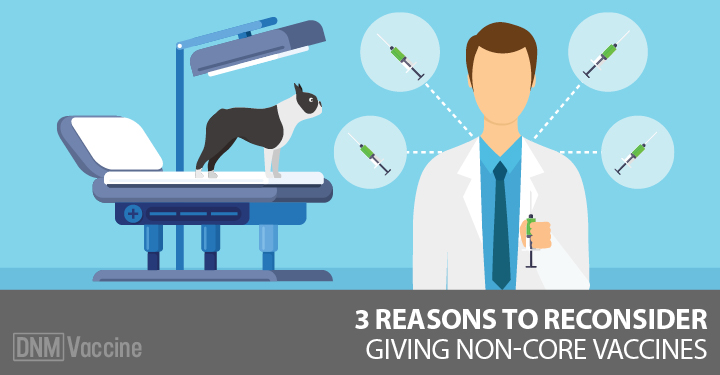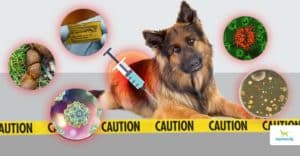When your vet gives your dog vaccines, do you ask whether they are core vaccines?
Don’t know what that means? Then you might want to read on …
Core vs Non-Core Vaccines
Many of the vaccines vets use on your dog are categorized as core or non-core.
The core vaccines include parvovirus, distemper, adenovirus (canine hepatitis) and rabies.
These vaccines all protect against viruses, which are easy to protect dogs against. In fact, viral vaccines are so effective that, when given to a dog over four months of age, they’ve been scientifically proven to protect that dog for years, and most likely for life.
The non-core vaccines aren’t in included in this group for three main reasons:
- They don’t work as well
- They don’t protect for very long
- They’re more dangerous
Let’s look at the non-core vaccines and the issues surrounding them.
Leptospirosis
The majority of dogs with known leptospirosis have been found to be without symptoms – they live with it without getting ill.
This isn’t to say that leptospirosis can’t cause illness in dogs. In some cases lepto can be fatal.
However, in the 1996 Canine Health Concern vaccine survey 100% of dogs with leptospirosis had been vaccinated within three months prior to infection. This can only be because:
- The vaccine caused the disease, or
- The vaccine didn’t contain the serovar that caused the illness, or
- The vaccine contained a non-local serovar that the dog hadn’t adapted to, or it just didn’t work.
If your vet recommends a lepto shot, you need to ask him two questions. The first is whether he has seen a case of lepto in the last, say, six months (i.e., is the vaccine necessary?). The second is which serovar is involved, and is that serovar in the vaccine? For if it’s not, the vaccine won’t help. There are over 200 versions of leptospirosis and vaccination against one form will not provide protection against the others.
The WSAVA VGG states,
“The leptospirosis vaccine is the one least likely to provide adequate and prolonged protection, and therefore must be administered annually or more often for animals at high risk. Protection against infection with different serovars is variable. This product is associated with the greatest number of adverse reactions to any vaccine.“
If you take time to understand the above advice, you’d have to conclude the vaccine doesn’t work and is dangerous. If something doesn’t work and is dangerous, why keep doing it?
[Are you confused about what vaccines your dog really needs and which ones she doesn’t? Not all vaccines are suitable for all lifestyles and situations. Grab our free Vaccine Guide. Download it, print it and bring it with you to the vet. This guide will help you come to a healthier vaccination schedule for your dog. Enter your email below and we’ll send this guide right to your inbox! …
The VGG adds,
“Leptospira vaccines provide short-term immunity (e.g., 3–12 months) and the efficacy is often less than 70%. Also leptospira products often prevent clinical disease but fail to protect against infection and shedding of the bacteria, especially when infection occurs more than 6 months after vaccination. The immunity among the serovars varies and immunity varies among vaccinated dogs. Persistence of antibody after vaccination will often be only a few months and immunological memory for protective immunity is short (e.g. 1 year or less). Thus, revaccination may be required as often as every 6–9 months for dogs at high risk.“
So, in summary:
- The lepto vaccine doesn’t protect a third of dogs;
- It might not protect any if the form of lepto in your area is different to the form in the vaccine;
- An annually vaccinated dog can be unprotected for up to nine months of the year; and infected dogs – irrespective of vaccination – are hidden infective reservoirs, capable of spreading lepto to humans and other animals.
- And yet – despite all this – leptospirosis is still a very rare disease in most parts of the world. There are virtually no records of dogs passing lepto onto humans, and we don’t hear of dogs with lepto often.
No human vaccine is currently available in the United States or the UK for lepto. Why, do you think?
The Lancet, Infectious Diseases Vol 3 December 2003 might explain why:
“Several problems confront the development of a vaccine to prevent human leptospirosis. First, an unacceptable side effect profile of killed bacterial vaccines has often been reported. Second, the killed bacteria vaccines are likely to provide only short-term and possibly incomplete protection, similar to that reported with anti-leptospiral vaccines in animals. Third, the locally varying patterns of Leptospira transmitted may preclude the development of a suitably generalisable vaccine. Fourth, there is theoretical potential for inducing autoimmune disease such as uveitis and, lastly, there is incomplete knowledge of mechanisms of protective immunity against leptospiral infection.“
The Lancet also stated: “Vaccination of animals such as dogs or cattle may prevent illness but not leptospiruria and hence transmission to human beings.”
Scientists have been trying to develop a human leptospirosis vaccine for decades – one that’s safe and effective and which governments will license around the world. They have failed.
But a dangerous, ineffective, substandard canine vaccine is out there, and will remain out there until pet owners educate themselves of the risks.
What is the leptospirosis vaccine doing on the WSAVA non-core list? It has no place there. It should be on the “not recommended” list. Leptospirosis is not even a vaccinatable disease, and the vaccine can kill!
Ask Alison Lovell what she thinks of this vaccine. Her beautiful GSD puppy was a perfectly normal little man the day before she was persuaded to give him the lepto shot. The day after he was brain dead, and the week after he was literally dead.
Ask Sue and Zoe Lewsley whose Champion Doberman, Tommy, experienced inflammation in his entire body after a lepto shot. Tommy was screaming in pain and couldn’t move. Within three months, despite extensive veterinary support, the nerve damage in Tommy’s body was so severe that he had to be put to sleep. An adverse vaccine event report was filed by Tommy’s vet.
But over 99% of vaccine reactions go unreported in dogs and cats.
Lyme Disease
As with leptospirosis, Lyme disease is also caused by a bacteria, but is transmitted through tick bites. Lyme disease exists in most states in America.
As with leptospirosis, not all dogs who test positive for Lyme disease suffer symptoms, and the disease can be treated with antibiotics or good holistic care.
The American College of Veterinary Internal Medicine (ACVIM), stated in 2005, “The ACVIM diplomates believe the use of Lyme vaccines is still controversial and most do not administer them.” Neither do the American veterinary schools recommend the Lyme vaccine.
Dr Patricia Jordan writes,
“In some cases, dogs develop Lyme disease despite the vaccine, or maybe because of the vaccine. Research dogs develop all the symptoms of Lyme disease up to six weeks after receiving the shot, while tests for the Lyme disease bacteria show up as negative. Left untreated more concerning issues develop.“
Cornell University’s School of Veterinary Medicine researchers suspect long-term side effects are associated with the Lyme disease vaccine for dogs, but nothing definitive has been documented or exhaustively studied, says Allen Schoen, a doctor of veterinary medicine in Sherman, Connecticut. “These side effects may vary from rheumatoid arthritis and all the major symptoms of Lyme disease to acute kidney failure.”
There is some controversy about how long a tick must be on your dog before it injects the Borellia bacterin that causes Lyme disease into him. Some say five hours, others say up to 70 hours. Therefore the safest and most effective “vaccine” would be to inspect your dogs daily and remove ticks before they attach, or as quickly as possible.
Other preventative measures include keeping your lawn short, not feeding wildlife near your garden and using other non-toxic forms of tick prevention.
Given the evidence, it is difficult to imagine why the Lyme vaccine isn’t on the “not recommended” list.
Kennel Cough
Kennel cough is caused by a variety of agents including – but not limited to – parainfluenza virus, adenovirus, and the Bordetella bronchiseptica bacterin.
The WSAVA informs us that,
“It is important to realize that not all members of the Kennel Cough complex have a vaccine. Also, because Kennel Cough is a localized infection (meaning it is local to the respiratory tract), it is an infection that does not lend itself to prevention by vaccination.“
Putting this is plain English, the WSAVA seems to be saying that kennel cough vaccines don’t work, or that kennel cough is not a vaccinatable disease.
Most combination canine vaccines contain injectable parainfluenza as well as adenovirus, expressed as ‘DHPPi = (D) Distemper, (H) Hepatitis/adenovirus, (P) Parvovirus and (Pi) Parainfluenza.
The Bordetella bronchiseptica vaccine is a live avirulent bacteria, given up the nose. It’s generally combined with intranasal parainfluenza. The WSAVA advises that “the Bordetella vaccine may promote transient (3–10 days) coughing and sneezing, and nasal discharge may occur in a small percentage of vaccinates.”
The implication of this, is (and the evidence suggests), that kennel cough vaccines cause kennel cough outbreaks.
Alison Hunt of the Tor View Kennels wrote to me, “We have just had a kennel cough case, meaning our workload goes into overdrive to isolate/disinfect even more. I’ve now found out that her owners were persuaded to have ‘up the nose’ drops on the 4th. The bitch came to us on the 16th, and started it all on the 26th.
“You can imagine the explanations and advice we’ve had to give to every other owner. It’s very time consuming. Hopefully we have controlled things, cordoning off areas, the staff spraying themselves, and so on. We’re taking a mass of precautions. Thankfully we’ve only had two cases, which we’ve been treating. We’ve also given the kennel cough nosode to every incomer.”
Although kennel cough is not a serious disease for the majority of dogs, it’s a serious disease for kennel owners. Their reputation and livelihood can be irrevocably damaged by vaccine-induced kennel cough outbreaks.
In its Guidelines document, the WSAVA states:
“Certain vaccines have a higher likelihood of producing adverse reactions, especially reactions caused by Type I hypersensitivity. For example, bacterins (killed bacterial vaccines), such as Leptospira, Bordetella (kennel cough), Borrelia (Lyme disease) and Chlamydophila are more likely to cause these adverse reactions than MLV viral vaccines.“
Type I hypersensitivity reactions involve an immune mediated reaction that releases potent inflammatory mediators and other chemicals that trigger an anaphylactic reaction in the affected animal. The reactions are usually acute, with the clinical signs appearing within minutes or hours of vaccination. Typical signs reported are facial oedema, shock, lethargy, respiratory distress and diarrhea. Severe anaphylactic reactions may result in death. Urticaria (hives), facial edema and anaphylactic shock are specific clinical manifestations of Type I hypersensitivities.
Ann wrote to me to tell me what happened to her dog Yogi, when he received a kennel cough vaccine. On the night of the vaccine, he was lethargic and quiet, hiding out in his kennel. The next day he was struggling to breathe and panicking, and an x-ray revealed an inflamed and collapsed wind pipe. A battery of tests costing £2,500 revealed no known cause, although the vaccine manufacturer offered £1,000 towards the bill. Ann told them where to stick their offer, feeling that they should be held responsible for the entire bill.
Once again, there is compelling evidence to suggest that kennel cough vaccines should not even be on the non-core list. Kennel cough is a transient disease and the vaccine causes outbreaks and risks more serious adverse reactions.
The only positive benefit for its existence is that it keeps booster income flowing for vets.
[NOTE] If the thought of vaccinating your dog is starting to sound scarier than kennel cough itself, but you still don’t know what to do, check out our free Vaccine Guide. This guide will not only help you figure out if your dog is being over-vaccinated, but how to set up a healthier vaccination schedule that suits you and your dog. Just add your email below and we will send it right to your inbox …
Source: Dogs Naturally Magazine, Non-Core Vaccines, Catherine O’Driscoll
References
1. Gomez, L. et al. 1998. Bacterial pneumonia due to Bordetella bronchiseptica in a patient with acute leukemia. Clin. Infect. Dis. 26:1002-1003.
2. Gueirard, P. et al. 1995. Human Bordetella bronchiseptica infection related to contact with infected animals: persistence of bacteria in host. J. Clin. Microbiol. 33:2002-2006.
3. Re, V.L. et al. 2001. Infected branchial cleft cyst due to Bordetella bronchiseptica in an immunocompetent patient. J. Clin. Microbiol. 39:4210-4212.
4. Sastre, J. et al. 1991. Pneumonia due to Bordetella bronchiseptica in a patient with AIDS. Rev. Infect. Dis. 13:1250-1251.
5. Tamion, F. et al. 1996. Bordetella bronchiseptica pneumonia with shock in an immunocompetent patient. Scand. J. Infect. Dis. 28:197-198.
6. Viejo, G. et al. 2002. Bordetella bronchiseptica pleural infection in a patient with AIDS. Scand. J. Infect. Dis. 34:628-629.
7. Wallet, F. et al. 2002. Pneumonia due to Bordetella bronchiseptica in a cystic fibrosis patient: 16S rRNA sequencing for diagnosis confirmation. J. Clin. Microbiol. 40:2300-2301.
8. Woolfrey, B.F. et al. 1991. Human infections associated with Bordetella bronchiseptica. Clin. Microbiol. Rev. 4:243-255.















